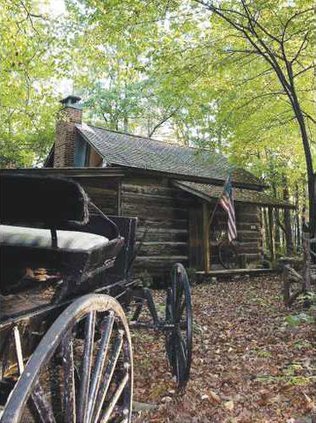To read the Appalachian Studies Center’s blog, click here.
Without ever setting foot in one of the 13 Appalachian states, many people reach a conclusion about what the region’s people are like. Thanks to stereotypical movies and television portrayals, more often than not that image is a negative one. "Appalachia is made up of diverse people and cultures," said Rosann Kent, Georgia Appalachian Studies Center program manager. "It’s quite the complex and fascinating place. It’s not all moonshine and banjos." Officially, Appalachia stretches down the East Coast from southern New York to the eastern border of Mississippi. Instead of letting outsiders define the people and lifestyles of Appalachia, the center — which is a part of the North Georgia College & State University’s campus in Dahlonega — has come up with a way to let the region speak for itself through an online blog. "Part of what we want to do is interrupt the stereotypes that are out there about what it means to live in these mountains," said Kent, who is also the managing editor of the blog. "We have a very small staff here at the center. It’s located in a specific time and space, but the blog is not. It reaches people all over the world at any time of day. "We wanted to use the blog to be able to have conversations with people anywhere about life in southern Appalachia. We wanted to have a front porch, if you will, that is open all the time." The virtual porch will be a setting for discussions like "What’s a hillbilly?" "Growing history: Heirloom Gardening in Practice" and "Two wheelin’ Through the Appalachian Season." The blog was started with the help of community volunteer Jimmy Booth and North Georgia graduate student Ross Burger, Kent says. Although it is moderated by the university’s staff, that won’t be the only voice heard in the posts. "We want to encourage not just the scholars to write, but also the community. Appalachia is full of diversity, so we want to incorporate as many voices as possible," Kent said. "We feel like a lot of times the people who have lived here and experienced the Appalachian traditions sometimes get left out of the conversation. We want their voices to be heard." Community members are invited to write blog posts and to also comment on what’s there. "We’ll post blogs once a week, but as we get more, we’ll post more often," Kent said. "The post is just the beginning of the conversation. The comments are just as important as the original blog post." The blog will cover art, history, music and nature. The first post was written by Helen Lewis, a Fannin County resident and Appalachia native. "(Lewis) is the grandmother of the Appalachian studies movement," Kent said. "She is the one that brought this region of Appalachia to the public’s attention. Anything we do here in North Georgia all has roots somehow to (Lewis) and her work. I’ve even taught courses based on her syllabus." In the late 1960s, Lewis, who is an anthropologist and sociologist, was an educator at the University of Virginia. In launching a social work program at the university, which is located in the heart of Appalachia, Lewis discovered that few of her students knew much about the region and its people. "As a part of the social work program, I created a course on Appalachian studies," said Lewis, who grew up in Nicholson and Cumming. "I felt like everyone, particularly those who came from the outside, needed to understand the mountains and the people who lived there." At the time, the area where Lewis taught was in the middle of an impoverished, mining community. A misconception at the time was that the people in the community were poor because they were lazy. But in reality, Lewis says they were living in poverty because the strip mining industry owned the majority of the resources and effectively shut out other industries and potential employers. "Half of the population left to find jobs. There was great unemployment," Lewis said. "A lot of problems emerged because of strip mining. If my students wanted to improve the quality of life of people in that area, they needed to look at the history of the problems and what was causing them. "In the earliest studies, we put a great deal of interest on social and economic issues." Other colleges became interested in the course, so she shared her Appalachian studies syllabus with other institutions across the country. "The course started out as an activist thing, but as we got more established, it focused more on history, music and literature," Lewis said. At first, Lewis says many Appalachian natives were resistant to the title because of the stereotypes associated with it. Today, she’s happy to see that more people have come to embrace it. Lewis hopes her book, "Helen Matthews Lewis: Living Social Justice in Appalachia" will make more strides for the movement. It will be released in January. In the meantime, the Appalachian Studies Center’s blog will serve as a dialog starter. "This blog shows that Appalachian culture isn’t just about history, it’s something that is very much alive and active today," Kent said. "We’re gathering stories and telling stories. It’s still here. Sometimes urbanization and globalization can obscure the view, but it’s still looking for and talking about."

